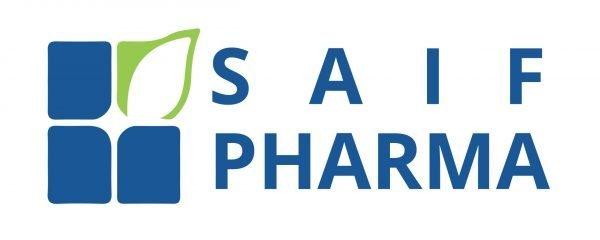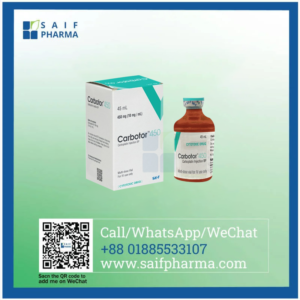Introduction
Pemitinib 13.5 mg (Pemigatinib) Tablet is an orally active, small-molecule inhibitor targeting fibroblast growth factor receptors (FGFRs). Designed to treat malignancies driven by FGFR aberrations, Pemitinib interferes with tumor cell proliferation, angiogenesis, and survival pathways. Manufactured under WHO-GMP conditions by Everest Pharmaceuticals Ltd and distributed globally by Saif Pharma, Pemitinib ensures reliable access to advanced targeted cancer therapy in hospitals and oncology centers worldwide.
Indications
Pemitinib (Pemigatinib) is indicated for adult patients with:
- FGFR2‑fusion or FGFR2‑rearranged cholangiocarcinoma after prior therapy (e.g., chemotherapy).
- Other FGFR‑altered tumors (e.g., urothelial carcinoma, ovarian, bladder) based on emerging clinical evidence and local approvals.
- Ongoing phase II/III trials explore its role in breast, prostate, lung, endometrial, and gastric cancers with FGFR mutations or fusions.
Mechanism of Action
Pemigatinib is a selective inhibitor of FGFR1, FGFR2, and FGFR3:
- Prevents FGFR-mediated phosphorylation signaling of FGF ligands.
- Interrupts downstream pathways such as RAS/MAPK, PI3K/AKT, and STAT.
- Inhibits tumor growth, vascular supply, and prevents malignant proliferation.
- Demonstrates antiangiogenic and pro-apoptotic effects in tumors with FGFR genetic alterations.
This targeted mechanism provides higher tumor specificity and reduced off-target toxicity.
Pharmacology & Pharmacokinetics
- Absorption: Peak plasma concentrations (C_max) achieved ~1–4 hours post-dose.
- Bioavailability: Not significantly affected by food; consistent exposure across patients.
- Distribution: ~75% plasma protein bound; minimal CNS penetration.
- Metabolism: Primarily via CYP3A4; minor contributions from CYP2C19 and CYP2D6.
- Elimination: Half-life ~12–17 hours; excreted via feces (~80%) and urine (~10%).
Therapeutic plasma levels are maintained with once-daily dosing.
Dosage & Administration
- Standard Dose: One 13.5 mg tablet once daily.
- Cycle: 21 days on, 7 days off (28-day cycle) or per local protocol.
- Administration: Swallow whole with water, with/without food.
- Missed Dose: Skip if >12 hours late; resume at next scheduled time.
Dose Modifications:
- Dose reduction to 9 mg or 4.5 mg for toxicity.
- No initiation at higher than 13.5 mg.
Drug Interactions
- Strong CYP3A4 Inhibitors (e.g., ketoconazole): Avoid or reduce pemitinib dose to 9 mg.
- Strong CYP3A4 Inducers (e.g., rifampin): Avoid due to reduced efficacy.
- Grapefruit and Seville oranges: Increase levels—should be avoided.
- Transporter Inhibitors: Caution with P-gp or BCRP modulators; monitor for toxicity.
- QT-Prolonging Agents: Use caution; monitor ECG when combined with cisapride, antiarrhythmics, etc.
Adverse Effects
Common (≥20%):
- Hyperphosphatemia
- Diarrhea, nausea
- Fatigue
- Stomatitis
- Alopecia
- Abdominal pain
Laboratory Abnormalities:
- Elevated serum phosphate, creatinine, lipase, AST/ALT
Less Common but Serious:
- Ocular: serous retinopathy, blurred vision
- Dermatologic: rash, dry skin
- Pulmonary: interstitial lung disease (rare)
- Cardiovascular: QT prolongation
- Dermatologic: palmar-plantar erythrodysesthesia
Most adverse events are manageable through dose interruption or reduction.
Warnings & Precautions
- Hyperphosphatemia: Monitor serum phosphate weekly for first 2 cycles, then monthly; manage with phosphate binders or dose adjustments.
- Ocular Toxicity: Baseline ophthalmologic exams recommended; monitor vision changes. Discontinue if central serous retinopathy occurs.
- QT Interval: Baseline and periodic ECGs advised; correct electrolyte imbalances.
- Hepatic Impairment: Reduce dose in moderate impairment (Child-Pugh B); avoid in severe impairment.
- Pregnancy/Lactation: Avoid; cause fetal harm. Advise effective contraception during and post-treatment.
- Pediatric Use: Not established.
Use in Special Populations
- Geriatric: No dosage change required; monitor for comorbid conditions.
- Renal Impairment: No adjustment for mild-to-moderate impairment.
- Hepatic Impairment: Reduce dose for moderate impairment; avoid in severe impairment.
- Dermatologic or Pulmonary History: Monitor for rash or lung toxicity.
Overdose Management
No specific antidote. Overdose may cause severe toxicity: nausea, diarrhea, hypotension, liver injury. Treatment is symptomatic and supportive. Activated charcoal may be considered early.
Storage & Handling
- Store at ≤25 °C, in a dry place, away from sunlight.
- Keep tightly closed and out of children’s reach.
- Comply with local regulations for disposal of cytotoxic drugs.
Why Choose Pemitinib 13.5 mg from Saif Pharma?
Saif Pharma delivers authentic, high-quality oncology medications to over 60 countries. Partnering with Everest Pharmaceuticals Ltd—a WHO-GMP–certified manufacturer—Saif Pharma ensures:
- Reliable supply chain for temperature-sensitive medications
- Competitive pricing for hospitals and oncology centers
- Regulatory and technical support for global markets
- Traceability and quality assurance in each batch
Pemitinib is ideal for oncology teams managing FGFR-altered tumors needing targeted oral therapy.
Clinical Benefits
- Targeted Mechanism: Effective in FGFR-driven malignancies
- Oral Administration: Convenient home dosing
- Favorable Safety: Manageable adverse events with robust monitoring
- Improved Outcomes: Demonstrated tumor response in FGFR2-fusion cancers
Conclusion
Pemitinib 13.5 mg Tablet is a precision oncology medicine deliberately designed to target FGFR-driven tumors. With compelling clinical data, manageable safety profile, and patient-friendly dosing, it represents a breakthrough in personalized cancer care.
Available through global delivery by Saif Pharma, Pemitinib offers oncology professionals a dependable, quality-assured solution for FGFR-related cancers, upheld by international manufacturing and distribution standards.







